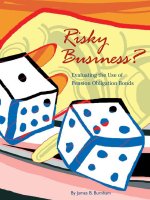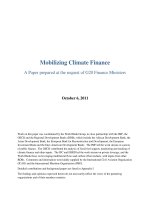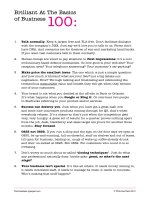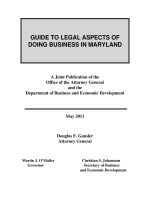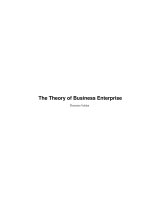Brilliant At The Basics of Business 100:1 pdf
Bạn đang xem bản rút gọn của tài liệu. Xem và tải ngay bản đầy đủ của tài liệu tại đây (64.12 KB, 10 trang )
Brilliant At The Basics
of Business
1 00:
Nicholasbate.typepad.com
© Nicholas Bate 2010
Brilliant At The Basics
of Business
1 00:
1. Talk normally. Keep it jargon free and TLA free. Don’t facilitate dialogue
with the company’s
DNA
. Just say we’d love you to talk to us. Firms don’t
have DNA. And
scenarios
are for theatres of war and marketing hand-books.
If you want real customers talk to them normally.
2. Human beings are wired to pay attention to first impressions; it’s a cool
evolutionary-based defence mechanism. So how good is your web-site? Your
reception area? Your telephone answering? Your customer’s car-parking?
3 Make price the smallest issue. The one which is just a simple question-
and how much is this/and what are your fees?
-not a big debate nor
negotiation. How? Through talking and illustrating and referencing the
tremendous measurable value and benefit they will get when they become
one of your customers.
4. Your brand is not what you decided at the off-site in Paris or Orlando.
It’s what happens when you Google or Bing it. Or over-hear two people
in Starbucks referring to your product and/or services.
5. Success can destroy you. Just when you have got a great cash cow
and some nice innovative products coming through for Q3, that’s when
everybody relaxes. It’s a shame as that’s just when the competition gets
very, very hungry. A great set of results for a quarter proves nothing apart
from the job, desk, blackberry and sales target are yours for another three
months. Stay focused.
6. 0825 not 0832. If you run a shop and the sign on the door says we open at
0830, be up-and-running, full-on-cheerful, stuff on shelves and out of boxes,
till open for business, heating on, mugs of wake-up coffee already drunk
and door un-locked at 0825. Not 0832. For customers who count it is so
irritating.
7. Don’t worry so much about so-called ‘closing techniques’. Just do what
any professional naturally does: he/she asks:
great, so what’s the next
stage?
8. Your business isn’t special. It’s like all others. It needs money coming in,
it needs motivated staff, it needs to manage its costs, it needs to innovate.
Who’s making that stuff happen?
Nicholasbate.typepad.com
© Nicholas Bate 2010
Brilliant At The Basics
of Business
1 00:
9. One 3 by 5 card. That’s all it needs. That’s all it should take. To express
your essential value to the customer. To detail your strategy. To detail your
pricing policy. To explain to an interviewee why he/she should join your
company. Get a stack: 3 by 5 articulation. More than enough.
10. Why do you want to be big? Quite. You really want to be profitable.
Which may or may not correlate with size.
11. Those PPT slides. The ones shown at every pitch. Are they for real? Or do
they pitch a fantasy that no customer has ever experienced. Make sure the
gap between the story told at the pitch and the real experience is zero.
Nada. Zilch.
12. What does your e-mail sign-off say about you and your company? Does it
make it as easy as possible to contact you? Does it emphasise how you are
unique? Is there a handy link or two? Or is it nothing? Or a paragraph of
legalese?
13. Stop wishing. Start selling. Stop imagining. Pick up the phones. Stop
playing with pipeline percentages. Ring every account and ask for business.
14. Are you excited about your business? No? Best find something else…
15. Never walk by something which could be improved in your business.
A dangerous trailing lead. A dog-eared brochure. A web-site link which
is broken. Notice it? Fix it.
16. The end of the quarter is only the start of the next quarter. Limping
from month to month simply isn’t going to work. Create hard, sustainable
value which is significantly different to your competitors. And price it right.
17. Grey is the new black. Certainty for your business is difficult to acquire.
Super precise long-term planning is out. Amazing responsiveness and
turn-around is in.
18. No ‘about’. Exactly what the margin is on that product. Exactly the product
mix in that sector. Exactly what international cell-phone costs are. ‘About’
businesses go bust. About when their money runs out.
Nicholasbate.typepad.com
© Nicholas Bate 2010
Brilliant At The Basics
of Business
1 00:
19. Train your people. Soft skills: how to answer the phone warmly. Technical
skills: how to use the spreadsheet quickly. Business skills: what a P&L is.
Clearly those skills help your business. But people who are invested in feel
loved. And stay longer. A nice RoI.
20. Here’s an interesting thing the majority of entrepreneurs will tell you-in
a hushed voice-after a Guinness or two.
Their strategy for success wasn’t at
all crystal clear until they had been running their business for a year or
two
. Because planning can never be reality. There’s a point where you
have to take the plunge.
21. Everybody sells. Everybody talks value, everybody dissolves resistance
to purchase and everybody spots sales opportunities. Sure there are some
in the business-‘salespeople’-for whom it is their final and number 1
accountability. But everybody sells.
22. Simply be better. At everything you do. Products are shipped faster.
Proposals are easier to read. Reception is friendlier. The coffee is worth
coming back for.
23. Revenue is good. Profit is great. But cash is pretty powerful, too.
Watch the right numbers.
24. (a) price-cost=profit
(b) profit x lots=sleep@night
Thus: price for a good night’s sleep. Not just ‘a deal’.
25. Get in early. Take off your coat. Pick up the phone. Make an hour’s worth
of calls. Close some business. Now have a coffee. That’s the correct
priority.
26. Some customers are just messers. Get so busy with profitable non-messers
that you can drop those who distract you from your core business.
27. Don’t look nor wait for ‘luck’, ‘a break’ or a kind investing angel.
Work hard, very hard and you’ll get really lucky. Always happens.
But that’s the sequence.
28. Worry less about providing Italian desks, away-days in Paris and 1h
dry-cleaning to your employees. And more about astonishing leadership
which gives clear direction and makes people feel valued.
Nicholasbate.typepad.com
© Nicholas Bate 2010
Brilliant At The Basics
of Business
1 00:
29. The customer is always right.
So long as they are being reasonable
.
30. Accounts, sales and marketing are NOT rival departments. They are a
seamless integrated operation. Right?
31. Setting a price is not a quick cell-phone conversation before catching
a flight to Boston. A price point is a subtle capturing of profit, customer
psychology, market penetration and positioning. Give it its due.
32. Dress code, meeting timings and prompt phone answering ARE important.
They’re a quick indication of how you handle bigger things.
33. Know where you really make money. It may not be where you want to
make it, used to make it or thought you made it. So long as you know.
34. A High Performance Business Team is not about having gone white water
rafting together. Nor a list of ‘core values’. Nor a fancy mission statement
on the wall.
Although any of these might help
. It is about absolute and
total loyalty to each other. Never talk negatively about a team colleague
who is not present; talk to him or her.
35. In business you are never ‘there’. You have never ‘won’. Success brings
attention which brings competition. Excellent service brings a demand for
outstanding service. It’s a journey: that’s what makes it exciting.
36. Keep your business lean, mean and frugal.
Especially when you are
making money
. Bloated companies cannot move quickly. And today’s world
of work needs responsiveness
37. It’s bizarre how some companies work so hard to keep the caller at bay
through hard-to-find direct lines, layered web-sites and obtuse call-centers.
Be easy to speak to, all the time, every time.
38. Technology allows almost every single ‘given’ of your business from
having
to be in the same office on the same continent in the same time zone
to opening hours to analyzing best product mix
to be questioned and
re-invented. What relics of old practices could you ditch allowing you
to focus on the timeless skills of leadership and selling?
Nicholasbate.typepad.com
© Nicholas Bate 2010
Brilliant At The Basics
of Business
1 00:
39. Get Skillful. Sportspeople, plumbers, painters, surgeons, cooks, farmers…
all get good then great at their skills. What skills do your team have?
Develop them. Good for them; good for the business.
40. If you could start your business again, do it over all differently, structure it
to be more customer focused and profitable… To be less ponderous? Would
you? You need to. We all need to. Every damn month.
41. What are you reading? We all need constant prodding, challenge and
inspiration. Reading is convenient, accessible and cheap. Try blogs (e.g.
www.execupundit.com); try traditional business books e.g. Free by Chris
Anderson and less ‘obvious’ books such as Rules for Radicals by Saul
Alinsky. Read.
42. Most businesses just ‘do’. Better ones plan before doing. The very best
ones review after doing. That plan-do-review never-ending cycle allows
constant improvement, innovation and creation of competitive advantage.
43. Never lead (solely) by title. Lead by presence, vision and sheer
‘ooommph’.
44. Business isn’t actually about metrics, KPIs nor talent matrices. It’s about
great people delivering fantastic solutions to customers. Don’t lose
sight of the real purpose of your business.
45. Don’t try and accommodate every customer. The more you do, the more
you can potentially dilute you initial strength that people loved you for. Sure
it’s a balance; just keep it tipped the correct way.
46. Never damage a business relationship. Apart from it not being pleasant,
be pragmatic. You never know when you might meet or need that person in
the future.
47. Write better business meeting notes. Divide the page 2/3, 1/3 vertically.
On the major part do narrative, diagrams, flow-charts etc. On the minor
part capture action+owner+delivery date.
48. Get to the airport early. Grab a coffee and work hard while awaiting your
flight call. Meditate on the plane. Arrive refreshed.
Nicholasbate.typepad.com
© Nicholas Bate 2010
Brilliant At The Basics
of Business
1 00:
49. What happens to the data in the complaint’s file? Hopefully it has a hot
link to the actions for the quality improvement team.
50. The mythologies of the start-up are entrancing: tiny offices behind delis,
lock-up garages and $22 logos. The reality: get on with it.
51. For your new business, have a plan. But it doesn’t need to be as fine-tuned
as a NASA flight document. Ask any successful entrepreneur: the plan only
really came fully together when they went live.
52. Keep asking: what else can we offer our current customers which would
(1) help them (2) make us money (3) but not destroy nor damage our
original business?
53. Starbucks, Disney and Amazon have systems to make it easy for the
customer. You need them too.
54. Apple, Harley-Davidson and Innocent Juices understand cool design.
You need to as well.
55. Asking
what sort of business do we want to be in five years time?
will not get you an accurate answer. But it should clarify where you want
to be by this time in 2011 which is an invaluable piece of data.
56. At the prospect review meeting (you do have one don’t you?), ask probing
questions. These are questions asked until the salesperson falters.
At which point you know there is work to be done.
57. Don’t mess about. Pay people properly.
58. You do have the answer to your current business problem.
But only some decent reflection time will allow you to articulate
it and hence act.
59. Define the job. Define the responsibility. Define the standard.
That’s delegation.
60. At the AwayDay, insist on a decent SWOT analysis. But more importantly,
clear documented actions that will be taken.
61. Review your expenses policy and its management: it undoubtedly
needs a revision and may well be costing you money.
Nicholasbate.typepad.com
© Nicholas Bate 2010
Brilliant At The Basics
of Business
1 00:
Nicholasbate.typepad.com
© Nicholas Bate 2010
62. Keep an eye on the competition. But don’t follow them like a fully-paid
up Private Investigator.
63. Yes it does matter. Many people really do mind that ‘customer parking’
has no spaces, that reception has last month’s business magazines and
the account manager had an indifferent attitude.
64. The trouble is for too many of the employees the only thing worth
mentioning about the annual conference is the free beer. Change
that perception this year.
65. ‘I didn’t have time’ is not a valid excuse for a smart, entrepreneurial
person such as yourself. Make tough choices.
66. What is the career path for your people? It’s a great motivator
and retainer of people.
67. Communicate. You know what’s going on, but do those on the shop floor?
In the call-centre? Out in the field?
68. Why aren’t people speaking out in meetings? Sending great ideas to the
board? Challenging-constructively-ideas coming out of product marketing?
What are they afraid of? That fear is not good for the firm.
69. Where is the waste in your business? Take a walk by shared printers
and notice the piles of abandoned paper on the floor. Now check debtor days
which have sneaked up from 30 to 42 days. And why-o-why are windows
open and air-con pumping?
70. More important than great offices, a cool logo and a function spreadsheet
is a sustainable, differentiated profitable idea on which to build
your business.
71. Starbucks VIA coffee is not a mistake. It’s what a great business with
resources does when looking for fresh ideas: experiment, learn,
implement/move on, repeat n times until next fabulous hit.
72. What’s your disaster recovery plan? Ash covers skies of Europe?
IT system down for 48h? Recession goes W? Get in the war room and
come up with plans B, C and D.
73. How many important numbers are you hitting on a consistent basis?
Debtor days for example? Or points of margin? Or employee satisfaction?
Brilliant At The Basics
of Business
1 00:
74. Get out of the office and find out what’s going on. What do customers
really think of you? Do those fancy initiatives you dream up at head office
actually work out in the field? Clear the diary and go observe.
75. Selling and Negotiation are different; do not confuse the two. Selling
is buying in principle. Negotiation is the terms of the purchase in detail.
Sell first. Then negotiate.
76. Quality isn’t an extra, it has to be a given. Never, ever, ever walk
by a quality issue.
77. Your corporate culture is not something which can be ‘rolled out’;
it is the sum of what individuals do on a day-to-day basis.
And understanding why do they do what they do.
78. Be careful what you say at the company jamboree. You say you care
for the employee above all else. But you act as if share price is all.
No wonder most of your employees display dysfunctional behaviour at times.
79. Keep a log to note how much of your time is simply reacting. And how
much of it is being proactive, choosing and investing. Build that latter
time dramatically.
80. Building a better business is certainly about giving the customer what we
want e.g. the plumber who tidies up after his/her work. But it’s also about
giving the customer what he/she didn’t realise they needed e.g. a text
telling of exact arrival time at your home to start work.
81. Challenge your assumptions. Work from the shop floor. Do a day behind
the counter on the phones or on the cold garage floor. Yep; maybe their job
isn’t so easy after all…
82. Don’t despise Starbucks. Observe how they have optimised systems
to an art form.
83. Don’t despise Apple. Observe how they have made design a significant
differentiator.
84. Don’t despise Abercrombie & Fitch. Observe how they use the senses
to sell. You can almost taste the quality of those hoodies.
Nicholasbate.typepad.com
© Nicholas Bate 2010
Brilliant At The Basics
of Business
1 00:
85. Don’t rush recruitment; you’ll live with the consequences for years.
Spend the right amount of time and money making the process as brilliant
as you can. Rather than too much time and money fixing the problem later.
86. It’s not the problem you have given your customer which causes them
to hate you, it’s the way you deal with it or not which will cause them
to really love or to really hate you.
87. Pinch the best ideas from your competition. Then build upon them.
88. Walk right across the open-plan office of every one of your teams. Sales,
accounts, etc., etc. Is each one brimming with calm, resourceful energy.
Why not?
89. ‘In the real world’. Don’t you love the defensiveness embedded in that
statement when it is thrown back at you? Ha-ha. The real world is what
you create. If you want a supportive company culture start with you.
90. How much do those disposable paper cups cost? How many does an
employee use on average per day? Could they make one do per day by
writing their name on it? They could. There are loads of other ways
of both saving the company money and respecting the planet.
Brainstorm them.
91. Be fast to act once you have decided upon something.
92. Check everybody is selling.
93. What is the essence of your business, your essential core.
Your raison d’être?
94. When you need more money, don’t necessarily think investors.
You may regret the freedom you give away which was actually the reason
you went into business in the first place.
95. Don’t use e-mail for anything which needs the expression of emotion
unless you have the skills of a Mills & Boon novelist. No: see them face-to
face or pick up the phone.
96. Stop and Think.
Nicholasbate.typepad.com
© Nicholas Bate 2010
Brilliant At The Basics
of Business
1 00:
97. You may well eventually be able to spend three days out of five on the golf
course, but don’t make that your goal. Most entrepreneurs work hard,
think, develop relationships, sell, chase money, innovate, have fun, pitch,
drink coffee. And sometimes play golf.
98. Notice how the small stuff can really wind you up when you are in
line for a coffee or dealing with your bank. Does your business do that to
its customers?
99. Your people will not be at their best if they do not have clear goals which
get them working. But equally they cannot deliver to their best if they are
stressed, anxious and/or exhausted. Great leadership is about guiding
people to that balance point of buzz and exhilaration, of working in
a great company doing great things.
100. Re-read this list. Create an action plan. Act. Re-visit the list in 30 days.
Continue. Have fun.
Nicholasbate.typepad.com
© Nicholas Bate 2010


